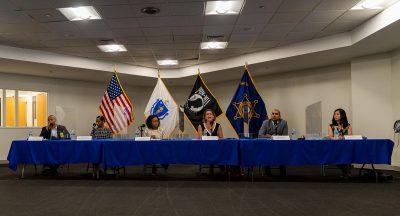
Boston mayoral candidates answered questions from incarcerated individuals and spoke about their criminal justice platforms at an in-person forum at the Suffolk County House of Corrections last Wednesday.
This was the first in-person forum with the Boston Mayoral candidates together so far, in front of an audience of incarcerated individuals.
The forum was moderated by the Suffolk County Sheriff Steven Tompkins and attended by Acting Mayor Kim Janey, Boston City Councilor Andrea Campbell, Councilor Annissa Essaibi George, Councilor Michelle Wu, State Rep. Jon Santiago, D-Mass., and John Barros, former chief of economic development for the city of Boston.
“We could not have done this effectively as a Zoom call,” Tompkins said in an interview. “The residents of the Suffolk County Sheriff’s Department really need to feel the energy of the candidates and really get a sense of who they are as people and as public advocates.”
The questions were asked and written by the voting-eligible population at the House of Corrections. Incarcerated individuals can still vote by absentee ballot in the Commonwealth if they are U.S. citizens, were not incarcerated for voter fraud or a felony offense under state law.
“To have [the candidates] here for the first gathering in person, I thought it was great, but equally as important if not more important for the audience that they were speaking to,” Tompkins said.
Candidates addressed racial inequities in the criminal justice system, the need for more mental health professionals in schools, homelessness and the substance abuse crisis.
At the forum, Campbell said reform to the judicial system starts with “good lawyering” and due process, in addition to the public electing legislators and a district attorney who can change what is criminalized at the state and federal level.
Campbell — whose father was incarcerated when she was a child — said bail reform is equally important to mental health support for the families of incarcerated individuals.
“It’s not just, of course, starting with the cradle-to-prison pipeline work but also legislation at the state level, the federal level, pushing for laws to be changed in such a way that it does not criminalize certain behaviors,” Campbell said.
Wu added that as mayor, she would work to ban racially discriminatory face surveillance, create community oversight and block schools from sending information to immigration officials.
The candidates also responded to a question about how they would support children who have a parent or family member who is incarcerated.
Essaibi George, a former Boston Public Schools teacher, said she would institute a full-time mental health professional in all schools to help support children during the school days, in addition to addressing other structural issues affecting families.
“At the same time while we work with moms and dads, we need to make sure that when they return to community, that there’s opportunity for affordable housing, that there’s opportunity for work, that there’s opportunity for living a healthy and safe life,” Essaibi George said.
The question of police officers at schools was also raised with a mixed response, with some candidates disagreeing on the differences between a “police officer” and a “school resource officer.”
Essaibi George said she was in favor of school resource officers, with whom she has worked with previously, while Campbell said they should not be at schools at all.
Barros also said Black and brown students with Individualized Education Programs — written education plans for children with disabilities — are often more policed than helped by mental health professionals or social workers.
“We need to design schools that support our students and not that are ready to make it punitive,” Barros said.
The candidates also spoke about the public health crisis of homelessness and substance abuse at the intersection of Massachusetts Avenue and Melnea Cass Boulevard.
Janey said she rejects the colloquial name “Mass/Cass” for the area, which she said takes away from the population’s humanity.
“These are people,” Janey said. “People who are in need of support, in need of services, in need of treatment.”
Janey said she is leading her administration to respond to the crisis similar to how the city handled the COVID-19 pandemic.
Wu said rebuilding the Long Island Bridge for access to a recovery services center on the island is not the end-all-be-all solution to the addiction crisis, but the city needs services such as supportive housing instead.
“When I talked to the providers, folks who are treating patients at Mass and Cass, they say even when our patients get on treatment, even when they get physically well, they don’t have a safe, clean, healthy home to go back to,” Wu said.
Janey highlighted her commitment to reimagining the city’s response to crisis and trauma in and outside of schools.
She added the city’s upcoming budget allots $1.75 million for a pilot program that would decriminalize mental health crises by allowing public health officials to be with first responders on the scene.
“We’re locking up people because they are poor, and they cannot afford bail, and that in fact is criminal,” Janey said. “We’ve got to do better.”
Santiago emphasized the necessity for the city to be proactive in addressing systemic problems and supporting impacted communities with issues such as gun violence.
“We need to be investing in programs that get at the root causes, whether that’s expanding economic and educational opportunities, housing opportunities and [addressing] systemic racism,” he said.
Candidates will meet again to debate pressing issues at various mayoral forums in the coming weeks, including a Thursday forum on climate justice.
“It’s important that people that are running for office stand in front of, sit in front of the people that they want to govern,” Tompkins said.





















































































































